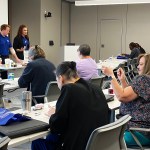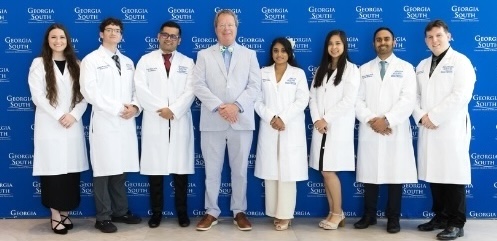Statewide Simulation Summit hosted at Ameris Bank Medical Education Center
Published 2:18 pm Monday, June 30, 2025


MOULTRIE – Colquitt Regional Health System collaborated with PCOM and the Technical College System of Georgia to host a statewide simulation training event.
Approximately 100 faculty members from TCSG convened at the Ameris Bank Medical Education Center to participate in immersive, hands-on training that focused on using high-fidelity manikins, moulage techniques (mock wound creation) and classroom simulation strategies. PCOM staff members, who were experts in simulation programs, led the instruction.
Jessica Rivenbark, vice president of medical education at Colquitt Regional Health System, said she and TCSG Director of Health Care Initiatives Tammy Bryant had a conversation after a nurse’s meeting about training and education and using simulation.
She said Bryant had an idea of what they could do to collaborate and bring in some partners. Bryant had also been in contact with PCOM about an articulation agreement in the technical college for simulation techs.
“We had the facility and we had the central location. … And we wanted to partner. … and just started having a conversation with the Technical College System of Georgia about what this could look like,” Rivenbark said.
She said PCOM has always been a long-standing partner with Colquitt Regional and has always been willing to step-up and provide services and support. She said, once they got onboard, the team was in place.
Bryant said in dialogues with technical colleges, across the state, it was identified that their faculty was requesting more simulation systems, on how they could apply it to their labs, get their students better-trained and into the workforce with better skills.
As far as the focus for the day’s training program, Rivenbark said the major push was, “How do you do sim? Less about providing a scenario and more about how do you plan, how do you train, how do you debrief?”
Bryant said, in a question and answer session, they were hearing from the faculty participants that they were very pleased with the outcome and thought they were taking away at least two to three ideas that could implement in their labs.
Assistant Commissioner for Technical Education Initiatives at TCSG Ben McCumber said a lot of his job was focused on collaboration and innovation.
“Because at TCSG, our primary customer is the student our backend customer is the industry. We’re in the middle. We want to serve both and we can’t keep doing things the way that we’ve always done them,” he said.
He said getting up and teaching from a Powerpoint and then sending someone into a hospital is not doing the student or hospital any favors. The student may do well on a written test, he said, but hospitals are messy, healthcare is messy. The student can experience, in a safe setting, what that’s like, he said.
“We also look at this as a model for what we should be doing with all of our instruction. We want to be able to connect to our students and we also have to be able to stay up-to-date with industry,” McCumber said.
Chief of Campus Operations at PCOM Joanne Jones said, “Students learn better with interactive simulations. They really do.”
Rivenbark said PCOM has been an instrumental partner because there was decades of experience with simulation and that is hard to find.
“So being able to tap into a resource that willingly said, ‘Yes, we’ll come from Philadelphia.’,” she added and Jones said there were employees from all three of PCOM’s campuses there today.
Nikki Gilbert, a healthcare incubator program manager with TCSG, said, “We’re delighted to be here, today, to partner with PCOM and Colquitt Regional Medical Center. We took this opportunity in response to a healthcare dialogue series that we did at the latter part of last year and the beginning of this year.”
She said they discussed healthcare gaps and also workforce needs and what kept coming up was that professional development was needed, specifically for their faculty.
‘Once we came to the table, we came-up with our Simulation Summit,” she said. “We’ve had great feedback, so far. We have been blessed to have not only faculty here but also people from the office of EMS.”
She said that helps them understand how we can partner with them to make sure that not only their students come out knowing what they are expected to learn but their educators understand the state requirements in that arena, as well.
Jennifer Corner, director for the ASN and PN program at Southeastern Technical College in Vidalia, said, “I’m so excited to be a part of TCSG’s first ever Simulation Summit. I feel like this a program that we need, definitely, in nursing education.”
She said it was getting harder and harder to find clinical site placement for their students in order to provide them with the opportunities to practice safe, competent care. She said it was also a great opportunity for the staff to learn what the students go through in the sim center.
“We get to feel all their nerves and experience what they feel. So, I think it will help better prepare us as we prepare the students,” she said.







